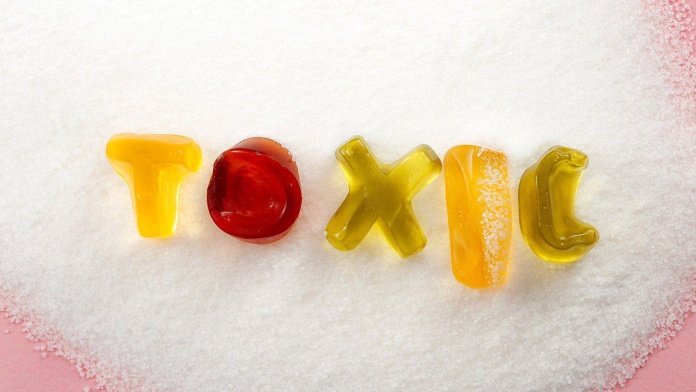
Is sugar really toxic?
Today I want to reflect on a question I was asked in a recent live social media Q and A, which was “is sugar really toxic”?
(I do these Q and As every week, by the way. They go out on the Ben Coomber Facebook page, Instagram, YouTube channel and Periscope, so keep an eye on these places to catch me and ask me stuff)
Now to jump the gun and lead with my conclusions I’m going to categorically say NO. In the sense that most people think of when they use the phrase, sugar is absolutely not toxic. To be toxic, according to Merriam Webster, is to be something that “contains or is poisonous material, especially when capable of causing death or serious debilitation” and I’m here to tell you that a few cubes of Tate and Lyle aren’t going to flat out kill you.
But that’s a bit too simple for my liking so I’m going to delve a bit deeper here. I think this is worth doing because simple questions with simple answers tend not to be asked all that often – they’re asked, they’re answered, eventually the solution just becomes part of the general knowledge that most people have and that’s about the end of it.
This is why most people over the age of about 8 don’t ask you whether the moon is made of cheese.
But this question deserves a bit more than a simple yes or no and that’s what I’m going to provide now. Ultimately there are two reasons why this question is interesting…
First – while the answer from a practical perspective is a categorical no, on some level the answer is also yes, because sugar definitely can be toxic, it’s just not toxic in the way that is often assumed. If your blood glucose is elevated for very long periods of time this can cause severe damage to your kidneys and peripheral limbs, which is why those with uncontrolled diabetes sometimes require foot amputation.
This is entirely irrelevant for people who do not have diabetes, or people who do but have things managed, but this fundamental truth does exist – if your blood glucose is seriously uncontrolled that can cause MAJOR harm, but that’s a very big and important if.
This goes into the problem of pseudoscientific brevity or briefness, which I’ve spoken about before and so far as I know I’m the person that coined the phrase.
Basically, you can make pseudoscientific claims and be REALLY brief and catchy when you do it. “Sugar is toxic”, “Vaccines cause autism”, “The world is run by an extra-terrestrial race of reptillians”.

All phrases that are quick, easy to understand, and attention-catching.
To then debunk these, you have to talk at length about normal blood sugar management and the insulin response, the genetic underpinnings and late materialisation of autism, and the fact that the reptilian truthers are probably right but so far we don’t have the evidence we need.
All of this takes time. It’s comparatively boring. It requires the listener to want to know the truth and to pay attention long enough for you to provide them with it, and so the pseudoscience peddlers will always have those that believe them. It’s just easier to provide falsehoods….
But to bring things back on topic, the idea that sugar is toxic in general based on the above fact of its effects in some specific circumstances is a complete logical fallacy – just because something can be problematic in some specific cases that doesn’t mean that it is a problem outside of those cases, and so while sugar may be harmful if it’s in your blood for too long thanks to an impaired insulin response, that doesn’t mean it’s toxic per se.
(And no, incidentally, just eating a lot of sugar during the day doesn’t cause this – what causes this is a chronic calorie surplus as well as an elevated carbohydrate intake)
This “just because it’s sometimes the case that doesn’t mean it’s always the case” thing with sugar is much like the argument about gluten or dairy – just because these things can be MASSIVELY problematic for some specific people, and so those people should work that out and act accordingly, that doesn’t make them remotely bad for everyone else. It’s funny that people talking about this usually also recommend eating almonds despite the fact they can quite literally kill people who are allergic to them…
The second reason that this question is interesting is because of the use of the word Toxic, which, again, according to Merriam Webster means “containing or being poisonous material especially when capable of causing death or serious debilitation”

Strictly speaking this is also true of sugar, in that there is an amount of sugar that would lead to death or serious debilitation.
But the same is also true of water
Or oxygen
Or fish oil
Or beans
Or literally anything else
In order to describe something as toxic it’s critical that you also include a mention of the dose. Arsenic, for example, is toxic, but arsenic is found in apple seeds. Nobody is kicking about calling for people to stop eating apples because of this, and that’s because substances on their own aren’t a problem, it’s the dosage that makes the poison.
Now of course, some things are more toxic than others. Botulinum (the thing in botox) is so toxic that a gram of it could kill roughly a million people, and a couple kilos is all you’d need to wipe us all out.
But sugar?
The LD50 (the dosage theorised/estimated to be enough to kill 50% of a tested population) is 30g/kg. For a 70kg person, that works out to 2100g (like 4 bags) of sugar, all eaten in one sitting. For context, the LD50 of salt is 3g/kg, so the same person might die if they ate 210g, which is less than is in my dining table salt grinder.
(note – these numbers come from scaled up rodent studies and so the actual amount for humans is almost certainly significantly, significantly higher)
So, what’s the lesson here?
In terms of nutrition, the word Toxic is basically meaningless and so by extension the phrase “sugar is toxic” is also meaningless.
It’s like saying that sugar is heavy. How much sugar is heavy? Am I carrying it in my shopping or lifting it with a crane? How long am I carrying it for? Are we comparing it to feathers or cement?
How much sugar is toxic, in what eating context, for what individuals, and what precisely will happen if you eat it?
If a person proclaiming the toxicity of sugar doesn’t get REALLY specific with their claim, it’s barely even a claim, so when you hear it don’t be afraid to really hone in on exactly what the person is saying.
Get them to make a REALLY specific claim, rather than some vague throwaway statement.
Then – and only then – can you realistically ask them to back it up with evidence.
And then you get to enjoy watching them fail at doing that.